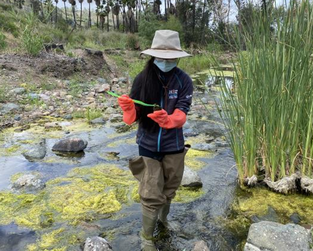 My name is Kathleen Nguyen, and I am currently a chemistry student at San Diego Miramar College and San Diego Mesa College. With the internship opportunity for the Disturbance Hydrology Lab led by Dr. Kinoshita, I was excited about the field work because I enjoy the great outdoors of San Diego and working on hands-on activities. Not only that, it was intriguing to learn more about the impacts of the California fires and seeing the vegetation and wildlife in Alvarado Creek. I have only worked with lab techniques in a chemistry setting, but working with the field equipment has increased my competence in my hands-on skills and knowledge on the field of civil engineering. As I am still growing as a student, I found the techniques and experiences of the Disturbance Hydrology Lab to be helpful in my academic career. Chemistry and civil engineering may be different disciplines, but they have similar methods to calculate and measure data. I have learned how to infiltrate water to observe Alvarado Creek’s soil water movement and rates, and analyzed field data with Excel for surveying. Data measured and collected from surveying was used to observe the land properties and vegetative state of Alvarado Creek. I have participated in stream gauging and pebble counts to understand collect information on stream processes. 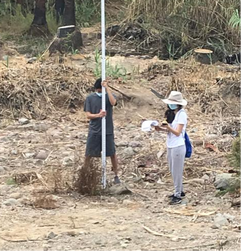 The internship activities have taught me about how diverse and inclusive civil engineering is, and I am intrigued with the hydrology aspect of it. Learning more about the different kinds of methods and techniques used in civil engineering has broadened my perspective on the kinds of careers that I am interested in going into and how it resonates with the field of chemistry. The hands-on experiences done with the Disturbance Hydrology Lab have enhanced my skills and confidence in the laboratory, and have geared me towards my future endeavors in the STEM industry. Despite the limited activities that could be performed during the COVID pandemic, I still had an amazing experience with the Disturbance Hydrology Lab. The Disturbance Hydrology Lab team are supportive and positive mentors. I enjoyed both the field work and working with them, and I have gained skills that will last me a life time not only academically, but skills that foster both communication and listening skills.
0 Comments
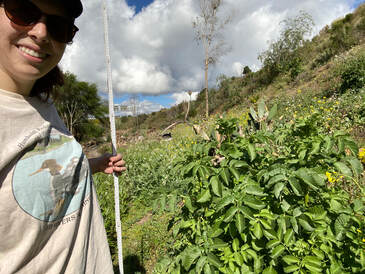 My name is Madeline Hapgood, I am an undergrad recently graduated from San Diego Mesa College, transferring to San Diego State University this fall. I had been studying geography and was excited when an opportunity to get experience in the field came up. After living in California and being so exposed to the damages wildfires can have upon a community made this experience even more meaningful to be a part of. When hearing about the projects being done on and around Alvarado Creek it was inspiring to hear what can and has been doane in the “backyard” of SDSU. Since this was my first time working in the field and doing research my knowledge of fieldwork and their processes were little to none. Overtime with every new fieldwork technique I learned I expanded my knowledge and passion for working in the environment. My project was based around the regrowth of the plant life from the burned area that had caught fire a month previous. In the beginning I was unsure what to expect and where to go from that point, where would I focus my research, how would I collect my research. With the help of mentors and volunteers I was able to go out and get help from others and learn other tools along the way. Not only did my project involve going out in the field and surveying vegetation heights and ground cover but I also got to use tools such as densiometers to calculate canopy cover. My project used a public photo point where the community was invited to share live photos of the site which would be shared to a public document. This was extremely helpful to have a visual timeline of the growth of plants throughout the time researching. Not only was this helpful for me as the researcher because I was not able to be there at the site all the time but also so the community could be involved and see the growth overtime as well they were welcomed to ask questions on the document as well. 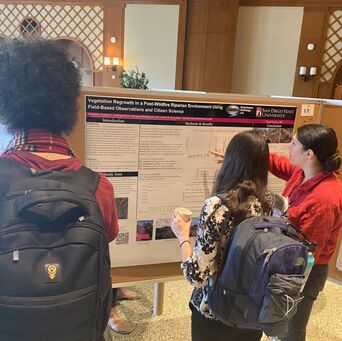 Although I was new to working in the field other skills and traits I had already helped me along the way. My creativity was one thing that I wouldn’t have expected to help throughout the research, research seems it would be rigid and strict but the opportunities and ideas can be endless. New skills I learned were learning how to learn again and accepting you may need to try and fail again. As well as to not expect an outcome to be one way or the other. The tools and research in the field were all new to me and were easy to learn along the way. Working in the field taught me that you can always learn new things and that it doesn’t all come naturally. This opportunity also taught me to believe in myself as well as thinking on your feet and diving into your research to see what can benefit you. I never considered myself a scholar or researcher but I never thought was possible especially as an undergrad. I had never planned on going to graduate school or getting a doctorate because I did not believe I could do it. This community and research opportunities showed me that I can do whatever I want and not let the unknowns keep me away. Talking with other researchers and getting experience at something I am passionate about made the experience meaningful. Being more detailed and planned would be a skill that would be important to have in this field especially when going out on the field with a partner. |
About the authorsFollow the adventures and reflections from the DHL undergraduate student interns and research assistants! Archives
June 2022
Categories
All
|
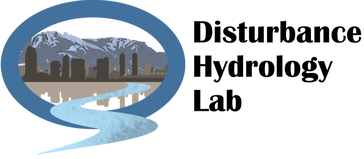
 RSS Feed
RSS Feed
